Concentration Camps: Ebensee Photographs
| Category » | Concentration Camps |
Reference
Documents
Main Concentration Camps
Labor, Transit, Internment & Sub-Camps
Join our mailing list
Support JVL
Donate
Click Left/Right to Scroll
-
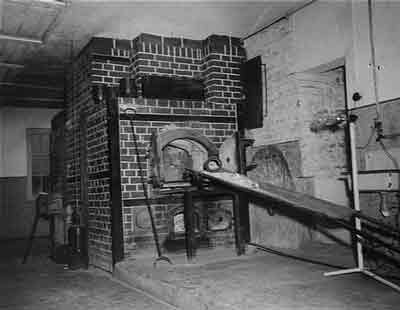 A Crematoria Oven at Ebensee (May 6-30, 1945)
A Crematoria Oven at Ebensee (May 6-30, 1945) -
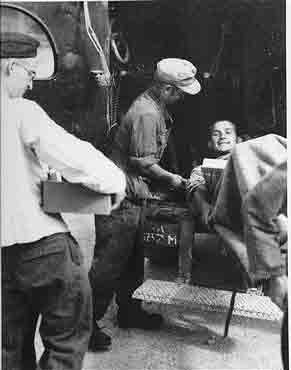 A survivor from Ebensee is loaded onto an ambulance to be taken to the 139th Evacuation Hospital by German personnel
A survivor from Ebensee is loaded onto an ambulance to be taken to the 139th Evacuation Hospital by German personnel -
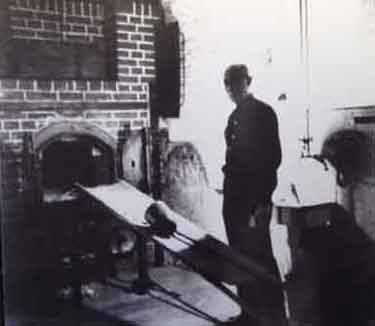 Image of Ebensee
Image of Ebensee -
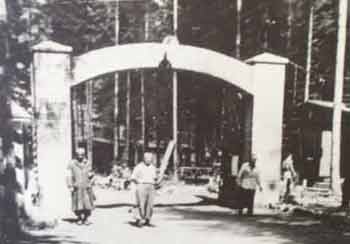 Image of Ebensee
Image of Ebensee -
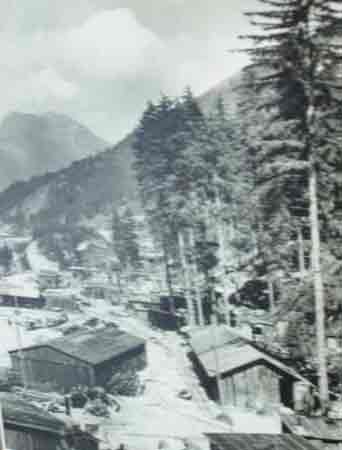 Image of Ebensee
Image of Ebensee -
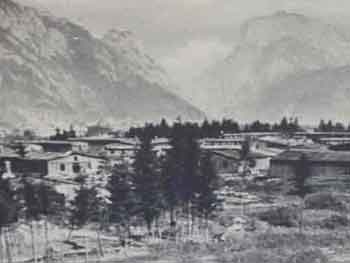 Image of Ebensee
Image of Ebensee -
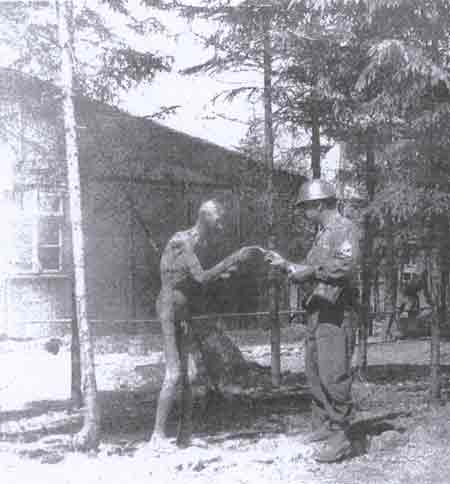 Sgt. Paul Lipman giving cigarette to liberated prisoner (photographer unknown)
Sgt. Paul Lipman giving cigarette to liberated prisoner (photographer unknown) -
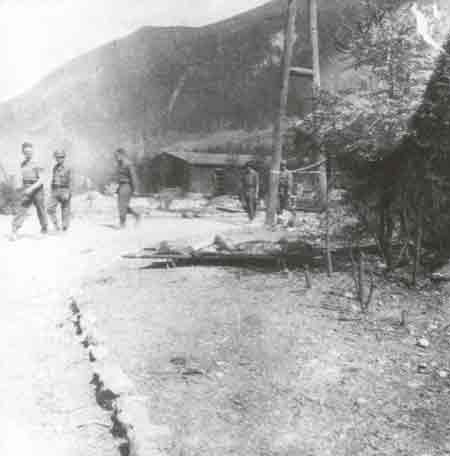 Dying Ebensee prisoner on stretcher
Dying Ebensee prisoner on stretcher -
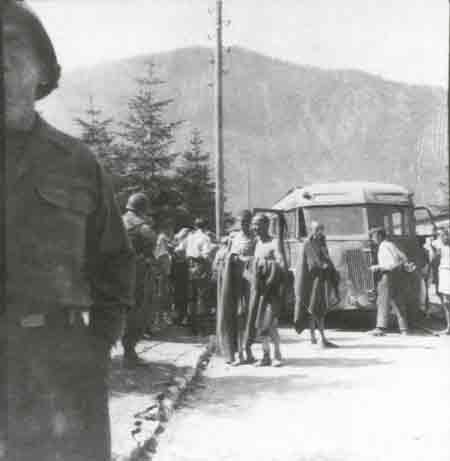 Liberated Ebensee prisoners waiting to get on the bus to leave camp
Liberated Ebensee prisoners waiting to get on the bus to leave camp -
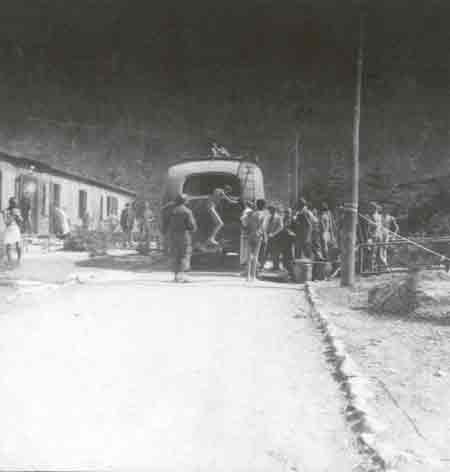 Liberated Ebensee prisoners waiting to get on the bus to leave camp
Liberated Ebensee prisoners waiting to get on the bus to leave camp -
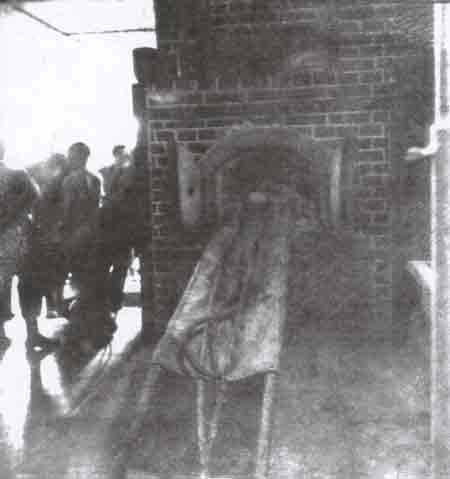 Ebensee crematorium with bones still in the oven
Ebensee crematorium with bones still in the oven -
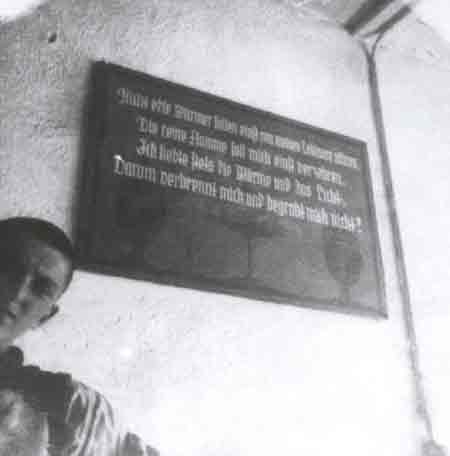 American soldier next to sign in German at Ebensee
American soldier next to sign in German at Ebensee -
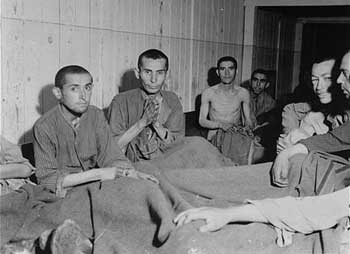 Survivors sit on the floor in the infirmary barracks for Jewish prisoners in the Ebensee concentration camp.
Survivors sit on the floor in the infirmary barracks for Jewish prisoners in the Ebensee concentration camp. -
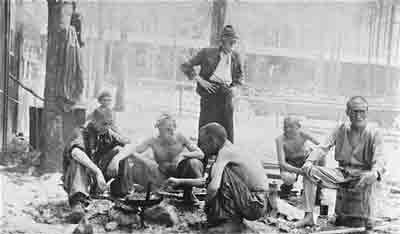 Ebensee survivors cook a meal over an open fire
Ebensee survivors cook a meal over an open fire -
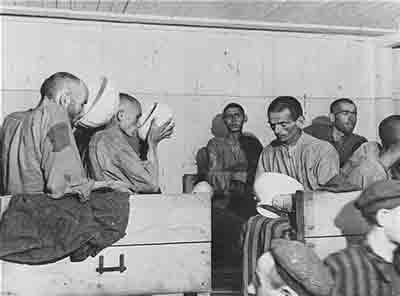 Survivors at Ebensee drink soup that was prepared for them by U.S. Army soldiers
Survivors at Ebensee drink soup that was prepared for them by U.S. Army soldiers -
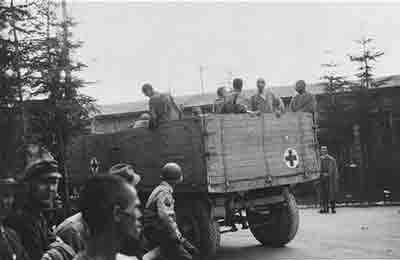 Survivors of Ebensee are evacuated to the 139th Evacuation Hospital for medical care/span>
Survivors of Ebensee are evacuated to the 139th Evacuation Hospital for medical care/span> -
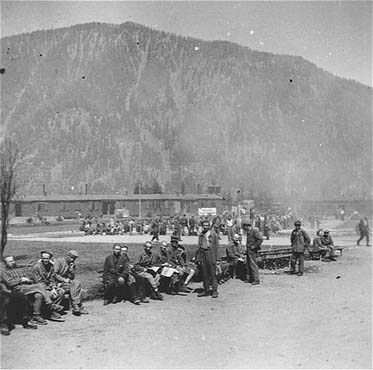 Former prisoners of Ebensee sit on benches surrounding the area where roll call was conducted
Former prisoners of Ebensee sit on benches surrounding the area where roll call was conducted -
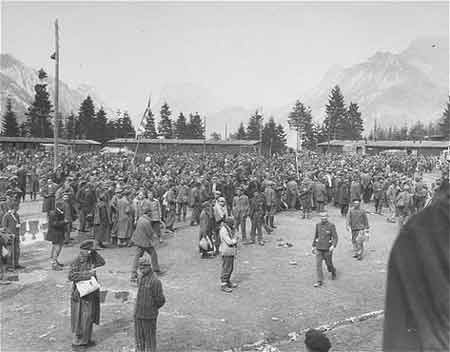 Survivors congregate in the former roll call area of the Ebensee concentration camp.
Survivors congregate in the former roll call area of the Ebensee concentration camp. -
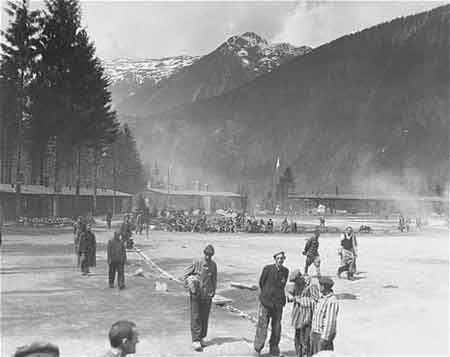 Ebensee survivors mill around the former roll call area. The snow-capped peaks of the Alps Mountains loom in the distance.
Ebensee survivors mill around the former roll call area. The snow-capped peaks of the Alps Mountains loom in the distance. -
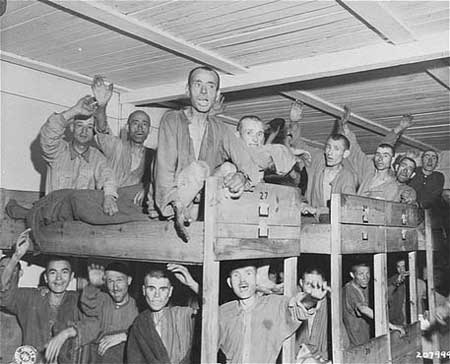 Survivors wave to American liberators from their bunks in the infirmary barracks for Jewish prisoners in the Ebensee concentration camp.
Survivors wave to American liberators from their bunks in the infirmary barracks for Jewish prisoners in the Ebensee concentration camp. -
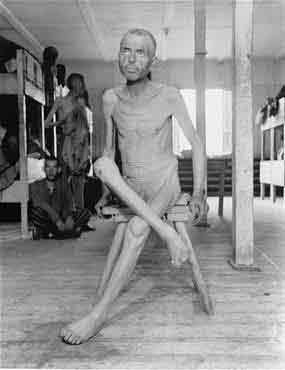 An emaciated Hungarian Jewish survivor sits on a stool in the infirmary barracks for Jewish prisoners in the Ebensee concentration camp.
An emaciated Hungarian Jewish survivor sits on a stool in the infirmary barracks for Jewish prisoners in the Ebensee concentration camp. -
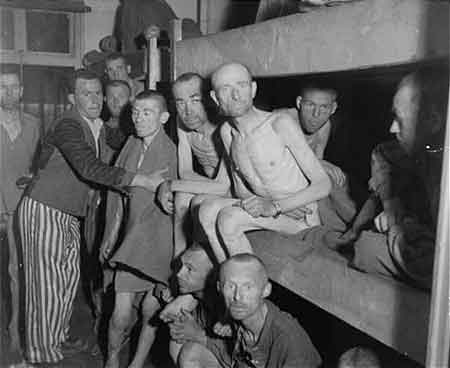 Emaciated survivors sit in bunks in one of the infirmary barracks in the Ebensee concentration camp.
Emaciated survivors sit in bunks in one of the infirmary barracks in the Ebensee concentration camp. -
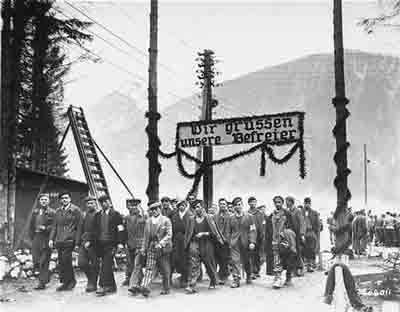 Former prisoners of Ebensee freed by the U.S. Third Army leave the camp under the sign “We Welcome Our Liberators”
Former prisoners of Ebensee freed by the U.S. Third Army leave the camp under the sign “We Welcome Our Liberators” -
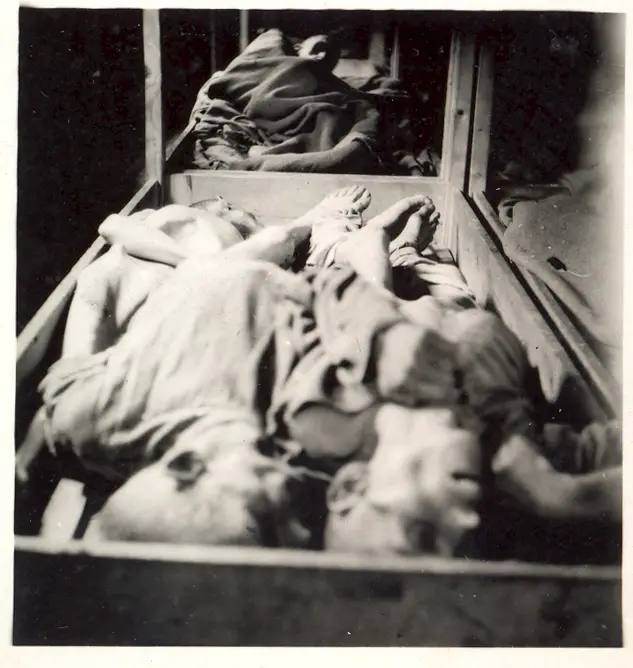 Survivors in Ebensee hospital barracks 2 (for Jews) after liberation. The young man second from the right in the front row is 16 year-old George Havas
Survivors in Ebensee hospital barracks 2 (for Jews) after liberation. The young man second from the right in the front row is 16 year-old George Havas -
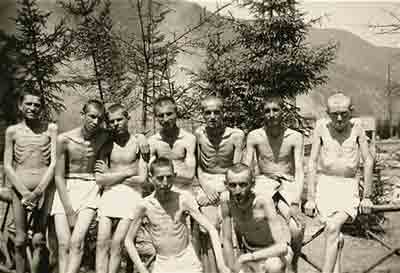 Survivors from Ebensee pose for a group portrait after showering in portable shower units installed by personnel from the 30th U.S. Army Field Hospital
Survivors from Ebensee pose for a group portrait after showering in portable shower units installed by personnel from the 30th U.S. Army Field Hospital -
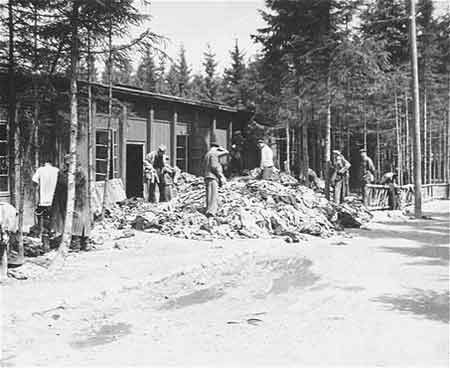 Ebensee survivors rummage through piles of clothing.
Ebensee survivors rummage through piles of clothing. -
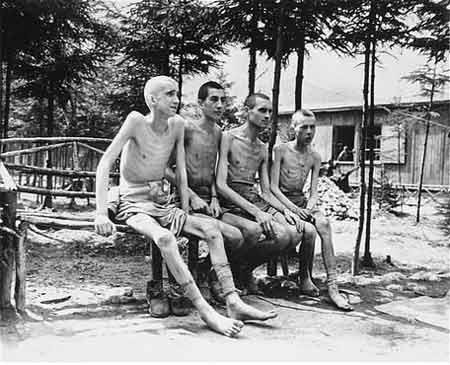 Starved Survivors in Ebensee
Starved Survivors in Ebensee -
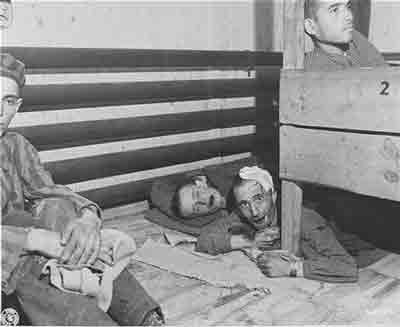 Survivors in the Ebensee infirmary for Jews. The people who could not fit into the bunks were forced to sleep on the floor.
Survivors in the Ebensee infirmary for Jews. The people who could not fit into the bunks were forced to sleep on the floor. -
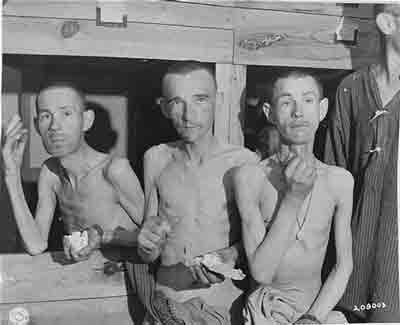 Survivors at Ebensee, too weak to eat solid food, suck on sugar cubes for strength
Survivors at Ebensee, too weak to eat solid food, suck on sugar cubes for strength -
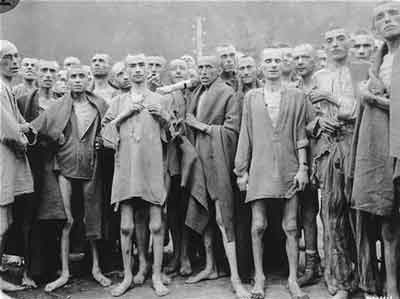 Ebensee survivors gather outside on the day of liberation. The survivor at center-left holding his metal name tag is Joachim Friedner, a twenty-one year-old Polish Jew from Kraków.
Ebensee survivors gather outside on the day of liberation. The survivor at center-left holding his metal name tag is Joachim Friedner, a twenty-one year-old Polish Jew from Kraków. -
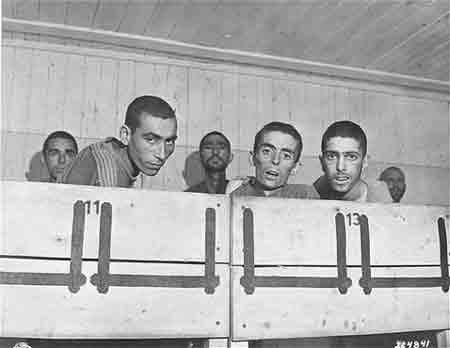 Survivors look out from the upper tier of a bunk in the infirmary barracks for Jewish prisoners in the Ebensee concentration camp.
Survivors look out from the upper tier of a bunk in the infirmary barracks for Jewish prisoners in the Ebensee concentration camp. -
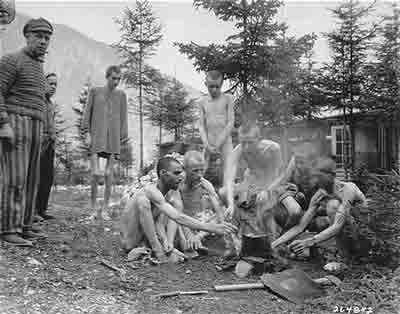 Ebensee survivors prepare a meal over an open flame. The man second from left is Josef Szuyt, the former clerk of barracks 16.
Ebensee survivors prepare a meal over an open flame. The man second from left is Josef Szuyt, the former clerk of barracks 16. -
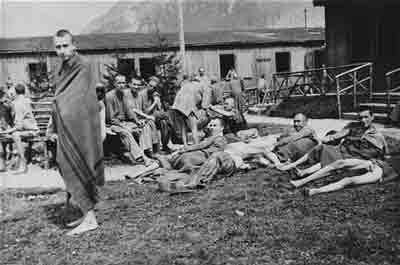 Survivors in Ebensee wrap themselves in blankets. The man in the foreground is Mr. Faiwl, originally from Kalisz, Poland, imprisoned in Warsaw ghetto, Czestochowa ghetto - Hassak labor camp, Bedzin ghetto, Auschwitz-Birkenau, Swietochowice and Ebensee, where he was liberated by the U.S. Army.
Survivors in Ebensee wrap themselves in blankets. The man in the foreground is Mr. Faiwl, originally from Kalisz, Poland, imprisoned in Warsaw ghetto, Czestochowa ghetto - Hassak labor camp, Bedzin ghetto, Auschwitz-Birkenau, Swietochowice and Ebensee, where he was liberated by the U.S. Army. -
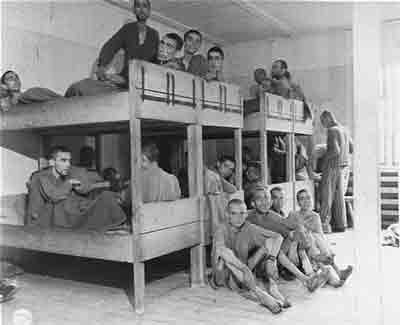 Survivors at Ebensee in hospital barracks #2 for Jews
Survivors at Ebensee in hospital barracks #2 for Jews -
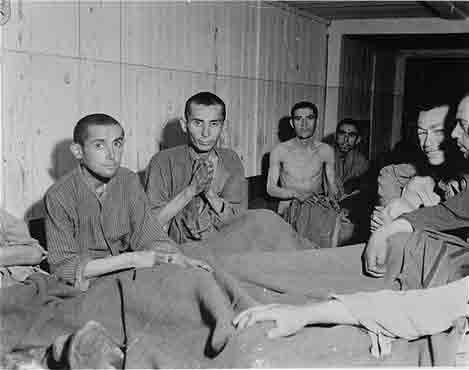 Four starved survivors at Ebensee sit in a bunk originally intended for one, while many of the sick lay on the floor
Four starved survivors at Ebensee sit in a bunk originally intended for one, while many of the sick lay on the floor -
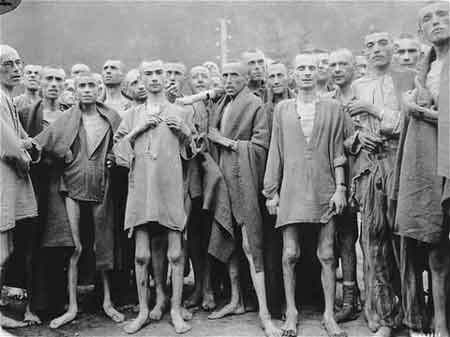 Emaciated Jewish survivors, who had been confined to the infirmary barracks at Ebensee, are gathered outside on the day after liberation. The survivor at center-left holding his metal name tag is Joachim Friedner, a twenty-one year-old Polish Jew from Crakow.
Emaciated Jewish survivors, who had been confined to the infirmary barracks at Ebensee, are gathered outside on the day after liberation. The survivor at center-left holding his metal name tag is Joachim Friedner, a twenty-one year-old Polish Jew from Crakow. -
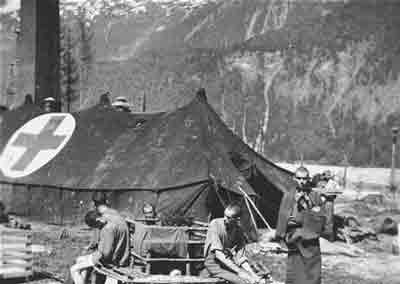 Survivors of Ebensee rest outside tents set up by the U.S. Army 30th Field Hospital
Survivors of Ebensee rest outside tents set up by the U.S. Army 30th Field Hospital
Sources: United States Holocaust Memorial Museum, Mitchell Bard from Mauthausen museum, Barry Lippa,


